Axillary bud - Study guides, Class notes & Summaries
Looking for the best study guides, study notes and summaries about Axillary bud? On this page you'll find 119 study documents about Axillary bud.
Page 4 out of 119 results
Sort by
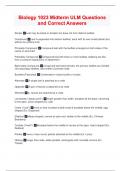
-
Biology 1023 Midterm ULM Questions and Correct Answers
- Exam (elaborations) • 6 pages • 2024
-
Available in package deal
-
- $8.99
- + learn more
Simple Leaf may be lobed or divided, but does not form distinct leaflets Compound Leaf is separated into distinct leaflets, each with its own small petiole (but without an axillary bud) Pinnately Compound Compound leaf with the leaflets arranged on both sides of the rachis or axis bract Palmately Compound Compound leaf with three or more leaflets radiating fan-like from a common basal point of attachment Bipinnately Compound Compound leaf twice pinnate, the primary leaflets are divided into ...
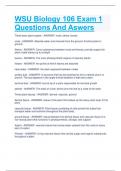
-
WSU Biology 106 Exam 1 Questions And Aswers
- Exam (elaborations) • 9 pages • 2023
-
Available in package deal
-
- $9.39
- + learn more
WSU Biology 106 Exam 1 Questions And Aswers Three basic plant organs - ANSWER- roots, stems, leaves roots - ANSWER- Absorbs water and minerals from the ground. Anchors plant in ground. Stems - ANSWER- Carry substances between roots and leaves; provide support for plant; holds leaves up to sunlight leaves - ANSWER- The main photosynthetic organs of vascular plants. Nodes - ANSWER- the points at which leaves are attached internodes - ANSWER- the stem segments between nodes axi...
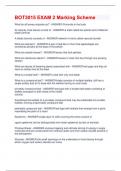
-
BOT3015 EXAM 2 Marking Scheme
- Exam (elaborations) • 7 pages • 2024
-
Available in package deal
-
- $8.49
- + learn more
BOT3015 EXAM 2 Marking Scheme What do all leaves originate as? - ANSWER-Primordia in the buds At maturity most leaves consist of - ANSWER-A stalk called the petiole and a flattened blade (lamina) A blade (lamina) consists of - ANSWER-network of veins called vascular bundle What are stipules? - ANSWER-A pair of leaf-like or thorn-like appendages are sometimes present at the base of the petiole What are sessile leaves? - ANSWER-leaves that lack petioles What are deciduous plants?...
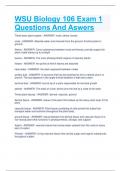
-
WSU Biology 106 Exam 1 Questions And Aswers
- Exam (elaborations) • 9 pages • 2023
- Available in package deal
-
- $12.99
- + learn more
WSU Biology 106 Exam 1 Questions And Aswers Three basic plant organs - ANSWER- roots, stems, leaves roots - ANSWER- Absorbs water and minerals from the ground. Anchors plant in ground. Stems - ANSWER- Carry substances between roots and leaves; provide support for plant; holds leaves up to sunlight leaves - ANSWER- The main photosynthetic organs of vascular plants. Nodes - ANSWER- the points at which leaves are attached internodes - ANSWER- the stem segments between nodes axillary bud...

-
WSU Biology 106 Exam 1 Questions And Aswers
- Exam (elaborations) • 9 pages • 2023
- Available in package deal
-
- $11.49
- + learn more
WSU Biology 106 Exam 1 Questions And Aswers Three basic plant organs - ANSWER- roots, stems, leaves roots - ANSWER- Absorbs water and minerals from the ground. Anchors plant in ground. Stems - ANSWER- Carry substances between roots and leaves; provide support for plant; holds leaves up to sunlight leaves - ANSWER- The main photosynthetic organs of vascular plants. Nodes - ANSWER- the points at which leaves are attached internodes - ANSWER- the stem segments between nodes axillary bud...
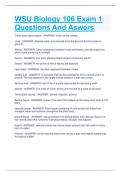
-
WSU Biology 106 Exam 1 Questions And Aswers
- Exam (elaborations) • 9 pages • 2024
- Available in package deal
-
- $11.99
- + learn more
WSU Biology 106 Exam 1 Questions And Aswers Three basic plant organs - ANSWER- roots, stems, leaves roots - ANSWER- Absorbs water and minerals from the ground. Anchors plant in ground. Stems - ANSWER- Carry substances between roots and leaves; provide support for plant; holds leaves up to sunlight leaves - ANSWER- The main photosynthetic organs of vascular plants. Nodes - ANSWER- the points at which leaves are attached internodes - ANSWER- the stem segments between nodes axillary bud...
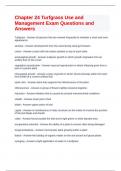
-
Chapter 24 Turfgrass Use and Management Exam Questions and Answers
- Exam (elaborations) • 2 pages • 2024
-
- $8.49
- + learn more
Turfgrass - Answer-all grasses that are mowed frequently to maintain a short and even appearance. seminal - Answer-development from the seed during seed germination crown - Answer-a stem with the nodes stacked on top of each other. extravaginal growth - Answer-turfgrass growth in which growth originates from an axillary bud on the crown vegetative reproduction - Answer-asexual reproduction in which offspring grow from a part of a parent plant intravaginal growth - Answer-a type of...

-
USABO Practice Study Guide With Complete Answers 100% Verified.
- Exam (elaborations) • 10 pages • 2024
-
Available in package deal
-
- $12.99
- + learn more
iodine deficiency - correct answer goiter ethane - correct answer C2H6 propane - correct answer C3H8 butane - correct answer C4H10 methane - correct answer CH4 enantiomers - correct answer mirror image i...
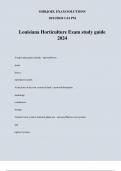
-
Louisiana Horticulture Exam study guide 2024
- Exam (elaborations) • 48 pages • 2024
-
- $11.49
- + learn more
Louisiana Horticulture Exam study guide 2024 4 major plant parts include - answerroots stems leaves reproductive parts 4 functions of the root system include - answerabsorption anchorage conduction storage 2 kind of root systems found in plants are - answerfibrous root systems and taproot systems ©SIRJOEL EXAM SOLUTIONS 10/11/2024 1:41 PM Fibrous root system - answerroot system that consists of numerous multi-branched roots that are slender; no one root is more prominent than th...

-
ISA Arborist Chapter 1 Questions and Answers Already Passed
- Exam (elaborations) • 15 pages • 2023
-
Available in package deal
-
- $9.99
- + learn more
ISA Arborist Chapter 1 Questions and Answers Already Passed Abscission Zone Area at the base of the petiole where cellular break down leads to leaf and fruit drop. Absorbing root Fine,fibrous roots that take up water and minerals. Most absorbing roots are within the top 12 inches (30cm) of soil. Adventitious bud Bud arising from a place other than a leaf axil or shoot tip,usually as a result of hormonal triggers. Aerial root Aboveground roots. Usually adventitious in nature and sometimes havi...

That summary you just bought made someone very happy. Also get paid weekly? Sell your study resources on Stuvia! Discover all about earning on Stuvia


